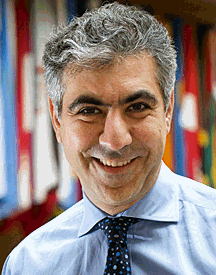
Typical street scene in Santa Ana, El Salvador. (Photo: iStock)
IMF Survey: IMF to Focus on Strengthening Post-Crisis Global Architecture
December 3, 2009
- IMF work program geared to strengthening global economy, international monetary system
- Fund to review its surveillance and lending mandate in light of crisis and its aftermath
- Governance reforms key feature going forward
Taking its cue from the policy decisions coming out of the Annual Meetings in Istanbul, the IMF has adopted a work program through April 2010.

Solar panel plant in China: Quota reform is seen as the key to enhancing the legitimacy and effectiveness of the IMF’s governance structure (photo: UPI Photo/Stephen Shaver)
POST-CRISIS POLICIES
The program offers an insight into the priorities of the Fund, now that the world economy is emerging from the worst economic crisis in 60 years.
In this interview, Reza Moghadam, the Director of the IMF’s Strategy, Policy, and Review Department, talks us through the IMF’s near-term priorities. Beyond the immediate task of seeing the global economy out of the current crisis, high on the agenda is how to reform the IMF’s mandate, how to give dynamic emerging market and low-income countries more say in the Fund, and figuring out how to discourage countries from once again building up vast reserves and adding to global economic imbalances.
In addition, the IMF will help countries decide when to phase out emergency support for their economies, now that the crisis is beginning to abate. The Fund will also assist the Group of 20 (G-20) industrialized and emerging market economies with implementing its new “mutual assessment process.”
IMF Survey online: The IMF has just published its work program for the next six months. Can you tell us about the key priorities that will drive the policy agenda in the run up to the 2010 Annual Meetings?
Moghadam: With glimpses of a global recovery now in sight, we as an institution are gradually shifting away from an urgent response to the crisis to more of a focus on what the global economy will look like after the crisis. I see a number of priorities:
Advise countries on strategies to exit from the policies they implemented during the crisis in a way that is credible, orderly, and cooperative.
Lay a foundation for a resilient global architecture, starting with a review of the Fund’s mandate in surveillance and lending, and looking into ways of improving the stability of the international monetary system.
Continue to strengthen our macro-financial and cross-country work, and to deliver new ways of analyzing risks and vulnerabilities, including through our early warning exercise and our analysis of common policy challenges countries are faced with.
Determine how best to assist the G-20 with their mutual assessment process. You may recall that G-20 leaders, at their meeting in Pittsburgh in September, agreed on a “mutual assessment” framework for strong, sustainable and balanced growth. The IMF was asked to assist the G-20 in this process.
Examine ways to make policy frameworks more resilient to crises. As part of this work, we are analyzing options to increase the financial sector’s contribution to defray the costs of financial crises. Many proposals have been put forward to that effect, including for a financial sector tax. We will be looking at the pros and cons of each of these options in the months to come.
And, importantly, deliver, by January 2011, on the call from IMF governors for a shift in country representation at the IMF of at least 5 percent toward dynamic emerging market and developing countries.

Moghadam: ”We are analyzing options to increase the financial sector’s contribution to defray the costs of financial crises.” (photo: IMF)
IMF Survey online: You mentioned the IMF’s mandate. What does a review entail, and how will the Fund go about it?
Moghadam: The basic question here is whether the Fund is adequately equipped to be an effective guardian of global macroeconomic and financial stability. Unfortunately, there are no easy answers.
We will be looking at every aspect of our work—surveillance, the Fund’s financing role and its implications for our overall size, oversight of the international monetary system, and how we work with other international organizations—to reach conclusions.
Because the issues are complex and interrelated, we will have a two-stage process to crystallize proposals. In the first stage, through April 2010, an initial set of papers will lay out the issues, followed by a second stage, leading up to the Annual Meetings in October, where more concrete proposals will be discussed.
As our own work takes shape early next year, we will start reaching out to policymakers and outside experts around the world to explore ideas and seek feedback.
IMF Survey online: You also mentioned IMF governance reform. What are the next steps here, and what is the timetable?
Moghadam: Quota reform has been recognized as the central element in enhancing the legitimacy and effectiveness of the Fund’s governance structure. Our governors have called for agreement to be reached in this area by January 2011. To achieve this, a series of papers related to the 14th quota review will be discussed before the Spring Meetings in April. The first paper will be ready in early 2010.
But the quota review is not the only reform on the table. We will also debate issues that were identified in the last governance report of the Executive Board to the International Monetary and Financial Committee (IMFC). These include reforming the IMFC itself, the composition of the Board, and how make the process for selecting IMF management more open and transparent.
IMF Survey online: The Fund has been asked by the G-20 to help it with its new process of mutual assessment. How does the IMF envisage its role?
Moghadam: The G-20 mutual assessment process is aimed at achieving strong, sustainable, and balanced growth. The IMF’s job will be to assist the G-20 countries achieve this goal by providing analysis on how their policy frameworks and economic projections fit together—or don’t fit! In other words, we see our role as that of a trusted advisor, with the G-20 countries firmly in the driver’s seat.
The mutual assessment process will also complement our own surveillance. Given that the process is driven by the G-20 members themselves, it offers us an excellent opportunity to reinforce the traction of our own policy advice to G-20 countries, both at the level of individual countries and at the multilateral level.
"The IMF’s job will be to assist the G-20 countries achieve this goal by providing analysis on how their policy frameworks and economic projections fit together—or don’t fit!"
IMF Survey online: The Fund has been called on to build on its recent reforms to its lending framework and explore a possible role as a lender of last resort. What should we expect to see in this area?
Moghadam: In an ever more financially interdependent world, the likelihood of globally synchronized crises is high. As was seen in this crisis, even advanced economies are not immune from liquidity crunches. Unless the IMF’s menu of financing options is perceived as a reliable alternative to self-insurance, many countries may intensify their efforts to accumulate reserves.
This current crisis has demonstrated the positive impact the IMF can have on market confidence when it provides rapid and large-scale financial support on flexible terms. The Fund’s ability to respond quickly with large resources where it was most needed was a key factor in stemming panic, preventing further bank runs, and arresting the continued free fall in currencies, all hallmarks of past crises. We now need to take stock of the crisis to see if we can build on our success.
A key question is whether the Fund can provide a credible liquidity backstop in both individual and systemic crises. For individual member countries, we need to review whether the design of the flexible credit line—used with great success by Poland, Mexico, and Colombia—and our new high access precautionary arrangements (HAPAs) can be made more effective, thereby reducing the need for countries to accumulate vast reserves.
"Unless the IMF’s menu of financing options is perceived as a reliable alternative to self-insurance, many countries may intensify their efforts to accumulate reserves."
For groups of countries, we need to consider whether providing a wider liquidity net for systemic crises is a possibility. For instance, could the Fund support a regional or multi-country liquidity pool? Work on these issues has just started, but similar to our plan for reviewing the IMF’s mandate, we will have a paper with preliminary thoughts ready before the Spring Meetings in April 2010.
IMF Survey online: The IMF is also looking into ways to improve the stability of the international monetary system, including how to help countries diversify their reserves. Can you bring us up-to-date on the Fund’s current thinking?
Moghadam: The current debate on the international monetary system involves many voices and covers many issues, so I will not attempt to summarize it here. What I will say is that any comprehensive reform of the international monetary system needs to address the costly appetite for reserves and consider the scope for diversifying the supply of reserve assets to strengthen the system.
Is there a case, over the long run, from a system centered on a single currency to one with multiple reserve currencies or even a global currency? Our paper on the future financing role of the IMF will tackle issues related to the precautionary demand for reserves, while a separate paper will consider other factors affecting the smooth functioning of the international monetary system.
"Any comprehensive reform of the international monetary system needs to address the costly appetite for reserves and consider the scope for diversifying the supply of reserve assets to strengthen the system."
Comments on this article should be sent to imfsurvey@imf.org


